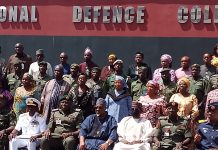By Our Reporter
The National Human Rights Commission NHRC has called on government at all levels to put measures in place to decriminalize petty offences.
According to the commission this will serve as one of the strategies to decongest detention/correctional facilities across the country.
The Executive Secretary of the Commission Tony Ojukwu Esq made this call during sensitization on decimalization of petty offences for stakeholders in the Justice Sector Institutions in Borno State.
The event was organized by the NHRC in collaboration with United Nations High Commissioner for Refugees (UNHCR) as an activity under the NHRC/UNHCR IDPs/Returnees Human Rights Monitoring Project.
Ojukwu who was represented by the Commission’s Director of Women, Children and Vulnerable Groups Mr. Harry Ogwuche Obe, said reports by human rights monitors on the field show that Internally Displaced persons (IDPs) also referred to as Population Of Concern (POCs) are held in detention and correctional facilities over petty offences such as begging, hawking, loitering, failure to pay debts, disrespect to parent, prostitution etc. “this seriously contributes to congestion in these facilities” he added.
He advocated that such petty offences should be considered as simple infractions or mere misdemeanor that non-custodian sentencing could be used as a punitive measure to curtail.
He added that “due to their vulnerability, the POCs always come in conflict with the law, as such the Commission will engage further with legislatures in Adamawa, Borno and Yobe states to ensure seamless processes to decriminalize of petty offences”.
He said once the decriminalization law is passed in any of these states, it will affect not only the IDPs but every one living within the community.
Participants at the event said due to poverty, petty offences are on the increase among the POCs because their circumstances have made them vulnerable, and constantly in need and unable to take care of their basic necessities.
While calling on the government and well-meaning Nigerians to intervene in addressing factors responsible for such petty offences, they also called on parents to raise up to their responsibilities by educating their wards to avoid been caught up in the trap of petty offences.













